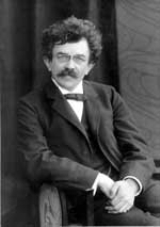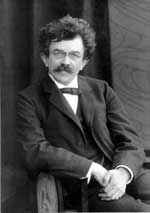
Max Herrmann
Encyclopedia

Germany
Germany , officially the Federal Republic of Germany , is a federal parliamentary republic in Europe. The country consists of 16 states while the capital and largest city is Berlin. Germany covers an area of 357,021 km2 and has a largely temperate seasonal climate...
literary historian and theorist of theatre studies. He is considered to be the founding father of theatre studies in Germany.
Born in Berlin
Berlin
Berlin is the capital city of Germany and is one of the 16 states of Germany. With a population of 3.45 million people, Berlin is Germany's largest city. It is the second most populous city proper and the seventh most populous urban area in the European Union...
into a Jewish family, Herrmann, having passed his A-levels
Abitur
Abitur is a designation used in Germany, Finland and Estonia for final exams that pupils take at the end of their secondary education, usually after 12 or 13 years of schooling, see also for Germany Abitur after twelve years.The Zeugnis der Allgemeinen Hochschulreife, often referred to as...
, in 1884 began studying Germanic Philology
German studies
German studies is the field of humanities that researches, documents, and disseminates German language and literature in both its historic and present forms. Academic departments of German studies often include classes on German culture, German history, and German politics in addition to the...
and History
History
History is the discovery, collection, organization, and presentation of information about past events. History can also mean the period of time after writing was invented. Scholars who write about history are called historians...
at the Universities of Freiburg
University of Freiburg
The University of Freiburg , sometimes referred to in English as the Albert Ludwig University of Freiburg, is a public research university located in Freiburg im Breisgau, Baden-Württemberg, Germany.The university was founded in 1457 by the Habsburg dynasty as the...
, Göttingen
Georg-August University of Göttingen
The University of Göttingen , known informally as Georgia Augusta, is a university in the city of Göttingen, Germany.Founded in 1734 by King George II of Great Britain and the Elector of Hanover, it opened for classes in 1737. The University of Göttingen soon grew in size and popularity...
and Berlin
Humboldt University of Berlin
The Humboldt University of Berlin is Berlin's oldest university, founded in 1810 as the University of Berlin by the liberal Prussian educational reformer and linguist Wilhelm von Humboldt, whose university model has strongly influenced other European and Western universities...
. In 1891 he became Privatdozent
Privatdozent
Privatdozent or Private lecturer is a title conferred in some European university systems, especially in German-speaking countries, for someone who pursues an academic career and holds all formal qualifications to become a tenured university professor...
for Germanic Philology at the University of Berlin and in 1898 he married Helene Schlesinger. In 1900 he gave his first lectures on theatre studies at the Department of Germanic Studies in Berlin. In his interpretation and analysis of Johann Wolfgang von Goethe
Johann Wolfgang von Goethe
Johann Wolfgang von Goethe was a German writer, pictorial artist, biologist, theoretical physicist, and polymath. He is considered the supreme genius of modern German literature. His works span the fields of poetry, drama, prose, philosophy, and science. His Faust has been called the greatest long...
's play Jahrmarktsfest in Plundersweilern he not only included results based on research of the original sources but also the stage history of the play. After having been appointed professor in 1903 he continued working as a free-lance lecturer and contributed to a number of literary societies, such as the Society for Theatre Studies. In 1914 he published his most renowned work "Research on the History of German Theatre in the Middle Ages
Middle Ages
The Middle Ages is a periodization of European history from the 5th century to the 15th century. The Middle Ages follows the fall of the Western Roman Empire in 476 and precedes the Early Modern Era. It is the middle period of a three-period division of Western history: Classic, Medieval and Modern...
and the Renaissance
Renaissance
The Renaissance was a cultural movement that spanned roughly the 14th to the 17th century, beginning in Italy in the Late Middle Ages and later spreading to the rest of Europe. The term is also used more loosely to refer to the historical era, but since the changes of the Renaissance were not...
" (Forschungen zur deutschen Theatergeschichte des Mittelalters und der Renaissance) in which he further specified his approach. In 1916 he founded the "Library of German Private and Manuscript Prints" (Bibliothek Deutscher Privat- und Manuskriptdrucke) at Berlin State Library
Berlin State Library
The Berlin State Library is a library in Berlin, Germany and a property of the Prussian Cultural Heritage Foundation.-Buildings:The State Library runs several premises, three of which are open for users, namely House 1 in Unter den Linden 8, House 2 in Potsdamer Straße 33 and the newspaper archive...
.
Herrmann advocated vehemently the emancipation of theatre studies from German Studies. In 1919 he was offered a chair at the University of Berlin. When, in 1923, the Institute of Theatre Studies at Berlin University, world-wide the first of its kind, was founded despite much resistance from the more established disciplines, Herrmann was appointed its head, a function he fulfilled alternately with Julius Petersen.
When Adolf Hitler
Adolf Hitler
Adolf Hitler was an Austrian-born German politician and the leader of the National Socialist German Workers Party , commonly referred to as the Nazi Party). He was Chancellor of Germany from 1933 to 1945, and head of state from 1934 to 1945...
was appointed Chancellor of Germany on 30 January 1933, Max Herrmann was deprived of his professorship by being forced to go into retirement. On 8 September 1942 he and his wife were deported to the concentration camp Theresienstadt
Theresienstadt concentration camp
Theresienstadt concentration camp was a Nazi German ghetto during World War II. It was established by the Gestapo in the fortress and garrison city of Terezín , located in what is now the Czech Republic.-History:The fortress of Terezín was constructed between the years 1780 and 1790 by the orders...
where Max Herrmann died in November 1942.
Until his deportation Herrmann worked on "The Development of the Professional Art of Theatre in Antiquity and Modern Times" (Die Entstehung der berufsmässigen Schauspielkunst im Altertum und in der Neuzeit) irrespective of institutionlised harassment which meant, for example, that he was only allowed to read books while standing. The manuscript of the book was preserved by a student of Herrmann's, Ruth Mövius, and only published in 1962.
Berlin State Library awards every year on 10 May, the anniversary of the Nazi book burnings
Nazi book burnings
The Nazi book burnings were a campaign conducted by the authorities of Nazi Germany to ceremonially burn all books in Germany which did not correspond with Nazi ideology.-The book-burning campaign:...
, the Max-Herrmann-Prize.
Works
- Forschungen zur deutschen Theatergeschichte des Mittelalters und der Renaissance. Berlin: Weidmannsche BuchhandlungWeidmannsche BuchhandlungWeidmannsche Buchhandlung is a German book publisher established in 1680 that remained independent until it was acquired by Verlag Georg Olms in 1983..-History:...
, 1914. - Die Bühne des Hans Sachs. Ein offener Brief an Albert Köster. Berlin: Weidmannsche Buchhandlung, 1928
- Die Entstehung der berufsmässigen Schauspielkunst im Altertum und in der Neuzeit. Berlin: Henschel, 1962.
Further reading
- Corssen, S. (1998). Max Herrmann und die Anfänge der Theaterwissenschaft. Tübingen: Niemeyer. ISBN 3-484-66024-4.
- Satori-Neumann, B. T. (1935). Die theatergeschichtlichen und dramaturgischen Schriften aus der Berliner theaterwissenschaftlichen Schule Max Herrmanns (1898-1933). Eine Bibliographie. Berlin: self-published.

